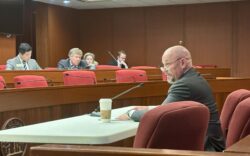Following five years of unsuccessful attempts by Georgia Republican lawmakers to expand the state’s school voucher program, GOP senators last Wednesday cast enough votes to send the latest version of the controversial plan to Gov. Brian Kemp’s desk.
Several Republican House members joined their colleagues in the Senate chamber to celebrate the so-called Georgia Promise Schools Act’s passage by a 33-21 party-line vote. The measure allows families with students enrolled in Georgia’s K-12 public schools to remove $6,500 of state funding provided to local school districts in order to attend private schools or to homeschool.
Critics of the vouchers continued to question whether $6,500 would be enough for cash-strapped families to afford the cost of tuition at many of the state’s better private schools. Sen. Greg Dolezal (R-Cumming) said that $6,500 is close to the state’s median private school cost, which should entice parents of students attending low-performing schools to send their children to a private school. According to Private School Review, the average private school tuition in Georgia is $11,893 per year, and tuition in the state ranges from $1,042–57,500.
Dolezal praised the GOP leadership in the House and Senate, as well as Kemp, for fighting to get Senate Bill 233 across the finish line ahead of the Mar. 29 deadline for this year’s legislative session. “I remember my freshman year 2019, when this bill failed on the floor of the Senate,” Dolezal said. “It means the world to me that five years later we united around this tailored bill that we can all agree is a step in the right direction.”
Different versions of so-called school choice proposals failed in recent years as a number of Republican legislators joined the majority Democratic lawmakers to block a plan they contend would divert taxpayer funding crucial to public schools to cover private schools. Several conservative state lawmakers from rural areas in the past have criticized the expansion of a voucher program that local school officials contend will cost them funding that will be hard to cover with local money.
Senate Bill 233’s notable changes this year are intended to address recurring criticisms of voucher programs by attempting to ensure vouchers are available to students from low-income families and hold private schools accountable by reporting to the state how those students are performing academically. According to the bill, private schools must administer standardized tests to students enrolled in the program. In addition, vouchers will be prioritized for families with household incomes under 400% of the poverty level, amounting to about $120,000 for a family of four.
If signed into law, the promise scholarship vouchers would first be available in the fall 2025 school year. Gov. Brian Kemp said earlier this year that the voucher program was a top legislative priority.
The bill caps the state’s investment into the program at 1% of the Quality Basic Education budgeting formula for K-12 public education, which now comes out to $141 million annually to cover tuition for about 21,500 students.
The program would have a 10-year window before it expires. Any student enrolled in the program when it ends will keep receiving the payments until they graduate from high school.
Sen. Elena Parent (D-Atlanta) compared the $6,500 voucher to a shiny object to misdirect attention away from how the legislature has failed to provide many school districts across the state with the financial resources they need to succeed.
“If you want to talk about real school choice, let’s put our money where our mouth is,” Parent said. “Give every kid $20,000, give $25,000, then we’d actually be talking about real school choice.”
Cobb County Republican Sen. Ed Setzler said the notion of school choice is often exercised by his fellow legislators and many other Georgians who have enough money to attend a strong academically performing public school or be able to afford homeschooling or private school tuition.
“Senate Bill 233 is for those single moms out there working two jobs to keep the lights on who wants school choice for their kids,” he said. “They can’t afford to move to a neighborhood in an area that has a successful public school. They can’t afford to move and sell their house because they’re upside down in their mortgage.”
Sen. Nabilah Islam-Parkes said private schools’ autonomy in choosing which types of students they want to accept likely means many students who might benefit most from being in a new environment would be left behind.
“This bill is a thinly veiled effort to segregate and discriminate, under the guise of choice. Private institutions free to pick their students will inevitably leave behind those who perhaps need the most support, like our special needs kids, our struggling learners,” said the Duluth Democrat.
Ross Williams contributed to this report, which originally appeared at georgiarecorder.com.
Like what you just read? Support Flagpole by making a donation today. Every dollar you give helps fund our ongoing mission to provide Athens with quality, independent journalism.










